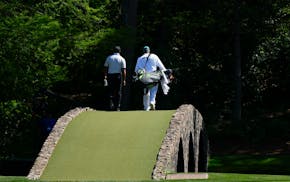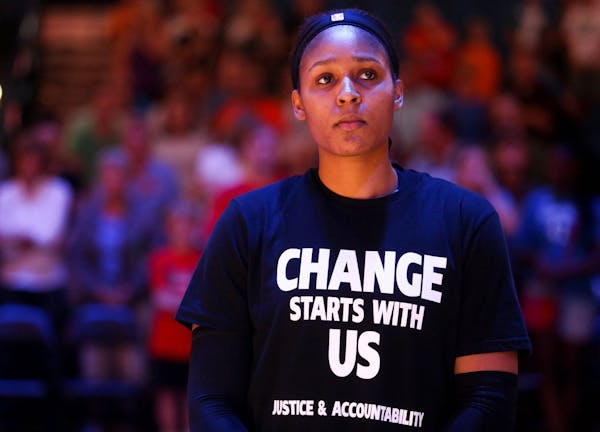Brett Favre allegedly defrauded Mississippi — his home state, and one of the poorest in America.
Aaron Rodgers is embarking on yet another pathetic offseason in which he demands attention, then pretends he's being victimized by those who pay attention.
Michael Jordan, in a "documentary" that played like a vanity project, revealed himself to be an egomaniac.
Tom Brady, who has made about a third of a billion dollars in the NFL, accepted a $960,000 PPP loan for his business during the pandemic.
Great athletes often trip while exiting the stage. Sometimes they stumble; sometimes they turn "pratfall" into a verb.
Which makes Maya Moore's life and career stunning, and perhaps unique.
On Monday — Martin Luther King Jr. Day — Moore announced her retirement from basketball, making official what had for years been obvious.
She leaves the stage with uncommon grace following an uncommon career.
She was a high school phenom, college star, WNBA superstar and Olympic starter, her teams winning 88% of the games in which she participated.
She won four WNBA titles in her first seven years as a pro, all with the Minnesota Lynx.
As she was drawing comparisons to Jordan as a player and surpassing almost everyone who ever dribbled a basketball as a winner, she abruptly retired from basketball at 29 to become a social justice warrior.
She delved into criminal justice reform and helped free Jonathan Irons, who had been wrongly imprisoned. She and Irons would later marry.
The story is too preposterous for fiction.
She could have become the most accomplished player in WNBA history. She chose to save a life.
Couldn't she have done both? That's what an ordinary person would ask. Why not continue to make money and win games in the WNBA and devote your free time to social justice? Why not use your platform in the former to elevate your work in the latter?
"Maya believed in having a singular vision," Lynx coach Cheryl Reeve said. "She was not one to divide her attentions."
For years, I found Moore to be an aloof interview. Eventually, I realized that she would warm to certain subjects.
Winning. Her teammates. And the importance of role models.
One day after a Lynx practice, she sat beside me under a basket at Target Center and talked about her middle school coach, who would yell to her to "fix your face!"
She didn't know what that meant, at first. Then she realized that she was a role model, whether she wanted to be or not; that children were watching, and so were her teammates and opponents.
She developed a posture to match her new mantra: chin up, shoulders back, eyes on the next task.
There was another advantage of good posture on the basketball court. "I began to be more self-aware," she said. "Oh, right — I can't pout or be out here looking super frustrated, because that doesn't help my team and it lets the other team know that they're getting to me."
Reeve would yell more at Moore than any other player, in part because she knew Moore would take the criticism without flinching, and in part because yelling at Moore sent the message that nobody was above hard coaching.
Combine statistical excellence, dominance and winning, and Moore easily ranks among the best athletes ever to compete in Minnesota. She may even belong at the top of the list.
Her announcement closes the book on a starting five the likes of which we will never see again:
Moore, who at times may have been the best player in the world.
Lindsay Whalen, the greatest Minnesota-born winner and perhaps athlete.
Sylvia Fowles, the greatest center in league history.
Seimone Augustus, a Hall of Famer, WNBA Finals MVP and Team USA cornerstone.
Rebecca Brunson, the only WNBA player to win five titles, and the all-time rebounding champ before Fowles passed her.
Without Moore, the Lynx might never have won a title. With her, they won four in seven years before she decided to train her singular vision on a new challenge.
Chin up. Shoulders back. Eyes on the next prize.

Souhan: This is KAT's chance to prove Flip Saunders was right

Souhan: Why Tiger Woods should keep swinging
Souhan: Scheffler wins Masters again, shows what makes him special
Morikawa falters in final round at Masters


